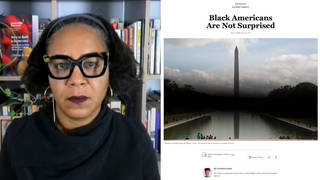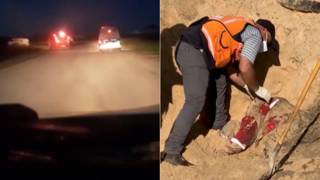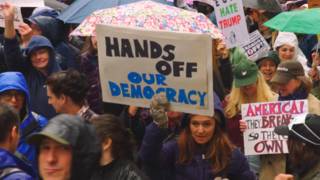
The Secretary of State discusses Sudan at UNITY 2004. We get a response from Smith College professor Eric Reeves. [includes rush transcript]
The Sudanese government and the United Nations have agreed on a plan that both sides say may avert UN sanctions being imposed on Khartoum. But human rights groups are already saying the plan does not come close to addressing the grave situation in the Darfur region of the country. A week ago the UN gave Sudan 30 days to disarm the “Janjaweed” militia or face unspecified economic and diplomatic measures. The UN characterizes the agreement as laying out a path to disarming pro-government militiamen, improve security and overall access to the region for relief workers. The UN estimates at least 30,000 people have died in Darfur and more than one million others have been displaced. But since the bloodshed began, the Bush administration has resisted calls to declare the violence genocide. That label would pressure the United States to do more to stop the violence.
A decade after the international community virtually ignored the genocide in Rwanda, Washington’s lack of effective action to major bloodshed in Africa is coming under criticism, most prominently from the US Congress. In late July, US lawmakers voted overwhelmingly to declare the killings, rape pillage in Darfur genocide. But despite weeks of investigating and a trip to the area by Secretary of State Colin Powell last month, the Bush administration says it still does not have proof of genocide. Yesterday afternoon, at the Unity Conference here in Washington DC, General Powell was questioned by reporters on the Bush policy in Sudan. This is CNN’s White House correspondent Suzanne Malveaux.
- Gen. Colin Powell, Secretary of State speaking at UNITY 2004.
- Eric Reeves, Smith College professor who has monitored and written about the Darfur crisis.
Transcript
AMY GOODMAN: Yesterday afternoon, at the UNITY Conference here in Washington, D.C., General Powell was questioned by a reporter on the Bush policy in Sudan. This is CNN’s White House correspondent, Suzanne Malveaux.
SUZANNE MALVEAUX: Mr. Secretary, former President Clinton in his memoirs recounts the genocide in Rwanda back in 1994, 800,000 men, women and children slaughtered at the behest of the state. He says it’s one of the greatest regrets that he has as president. As you had mentioned before, the situation in Darfur looks like the same thing could happen there. 300,000 killed. One million at risk. Congress, both the House and the Senate, has declared that it is genocide. What will it take for this administration to declare that this is genocide in Sudan, and is the U.S. committed to using peacekeeping troops?
COLIN POWELL: It’s not 300 — I’ve never heard of 300,000 have died, if that’s what you said, Suzanne. I’ve never heard that statistic. But it’s clear that tens of thousands have died. The situations are not directly parallel but that’s not the issue. The issue is there are over one million people who are in need now. They need food. They need hospital care. They need clean water. They need sustenance and we’re doing everything we can to make that available to them, working with the international community. We have not turned away. The question of genocide is a legal determination. Congress did pass a resolution and it was the opinion of the Congress that it should be declared genocide. I have to gather data from people I have in the field now who are interviewing people to reach the legal definition of genocide and I’ll make a judgment in the next couple of weeks as to whether it does or does not meet that test. But that’s not really the issue and we shouldn’t let it distract us because declaring it a genocide does not require or cause any action that we are not now taking or could not take right now without a declaration of genocide. And so we’ve got an open mind on it. We’ll look at the facts as the facts come in. But we’re working hard to get the food in, to get the supplies in, and to see what peacekeepers might be appropriate. Keep in mind that there is no international resolution. There’s no U.N. resolution that allows peacekeepers to go in without the permission of the Sudanese government, and if you’re going in there you have to have a clear idea of what you’re going in for and how large an area you’re going to have to occupy. The Darfur region of Sudan is the size of France. It is not a trivial military undertaking. And we believe that there are other ways to deal with this problem before thinking of that kind of solution. And the principal way is to get the Sudanese to use all of the assets available to them, working with the African Union. There is no reason the African Union cannot play a leadership role in this, both with monitors, who they’ve sent in, protection forces for the monitors, on the way in, and now consideration being given to African Union monitoring forces and peacekeeping forces. That’s the best way to go forward with this. And the strong resolution we got from the U.N. last week seems to have made it clear to the Sudanese government that they have to take action now and they will be measured by the action they take when we reconvene in August to take a look at the 30-day point on the resolution. We have to calibrate the pressure that we apply on the Sudanese government to make sure we get the results we need and we don’t create a more difficult situation for us and for the people of Darfur.
AMY GOODMAN: Secretary of State General Colin Powell addressing the UNITY Conference yesterday. We’re joined on the telephone by Smith College Professor Eric Reeves who has monitored and written about the crisis. Your response to Colin Powell?
ERIC REEVES: Well, I would need a very long time to point out all the errors of fact and analysis in Secretary Powell’s response to Ms. Malveaux’s question. Let me begin with just a couple factual corrections. We know that at least 1.5 million people have been displaced. Statistical analyses I’ve conducted on the basis of N.G.O. data and data from the U.S. Agency for International Development suggests that over 100,000 have died. But most troubling is Mr. Powell’s suggestion that we’re doing all we can. In fact, we’re not. We know that this is a humanitarian crisis of proportions far in excess of what we can respond to with present resources. Transport and logistical capacity for the 2.2 plus million people described by the United States, the U.N., the European Union as war-affected in early June, a number that has certainly grown, requires approximately 35,000 metric tons of food per month. And for the foreseeable future, since the Janjaweed predations and attacks have destroyed all agricultural production throughout Darfur. Unless there’s humanitarian intervention, which begins to make up for the huge gap between humanitarian capacity and humanitarian need, we will see far more than 300,000 people dead.
AMY GOODMAN: Eric Reeves, the response of the U.S. Congress.
ERIC REEVES: The Congress appropriately designated this genocide. I think all the evidence coming from all the organizations that have done human rights investigations inside Darfur and along the Chad-Darfur border make it clear that this is genocide. But this was also an tendentious error on Mr. Powell’s part. The 1948 Convention on the Prevention and Punishment of the Crime of Genocide does not require that we have a legally, air-tight case that genocide is being committed before we take up our contractual obligation to prevent genocide. In fact, that is the real purpose of the genocide convention. It’s not to correct the historical record later as to whether this event or that event was or wasn’t genocide. It’s to prevent genocide. Genocide is now occurring. There is abundant, overwhelming prima facie evidence. Mr. Powell and the United States and every single member of the security council, all contracting members to the 1948 genocide convention, have an obligation, a legal, contractual obligation, to prevent genocide. The resolution of last Friday does not begin to address the problem of genocide. Sanctions are utterly irrelevant at this point. They cannot possibly respond in a timely fashion to a catastrophe that is now claiming over 2,000 lives per day according to U.S. Agency for International Development data.
AMY GOODMAN: Eric Reeves, I want to thank you for being with us. We’ll absolutely follow up with you next week here on Democracy Now! Eric Reeves, professor at Smith College, monitoring and writing about the Darfur crisis.












Media Options